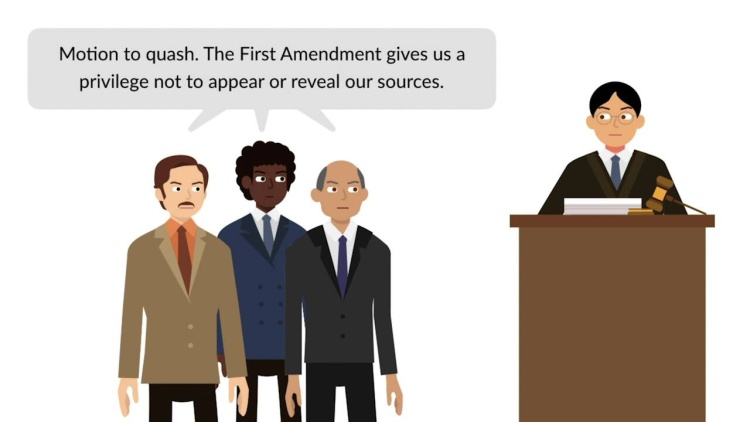Branzburg v. Hayes
United States Supreme Court
408 U.S. 665, 92 S. Ct. 2646, 33 L. Ed. 2D 626 (1972)
- Written by Megan Petersen, JD
Facts
Branzburg, a staff reporter for the Courier-Journal, wrote an article describing in detail his observation of two young residents of Jefferson County synthesizing hashish from marijuana. Branzburg was subpoenaed but refused to identify the residents. A state-trial-court judge ordered him to answer and rejected his argument that his refusal was protected by the First Amendment. Pappas, a television newsman-photographer, secretly recorded and photographed a prepared statement read by a leader of the Black Panthers. Pappas was later summoned before the Bristol County Grand Jury and asked what he observed with the Black Panthers. He refused to answer any questions, citing the First Amendment protection of freedom of the press. Earl Caldwell, a New York Times reporter, covered the Black Panther Party’s activities. He refused to respond to a subpoena requiring him to produce information gathered about this group. Hayes and other prosecutors (plaintiffs) held Branzburg, Pappas, and Caldwell (defendants) in contempt of court. Branzburg, Pappas, and Caldwell challenged their contempt convictions on the ground that the First Amendment protected them. The United States Supreme Court granted certiorari to consider the consolidated cases.
Rule of Law
Issue
Holding and Reasoning (White, J.)
Concurrence (Powell, J.)
Dissent (Stewart, J.)
What to do next…
Here's why 904,000 law students have relied on our case briefs:
- Written by law professors and practitioners, not other law students. 47,100 briefs, keyed to 995 casebooks. Top-notch customer support.
- The right amount of information, includes the facts, issues, rule of law, holding and reasoning, and any concurrences and dissents.
- Access in your classes, works on your mobile and tablet. Massive library of related video lessons and high quality multiple-choice questions.
- Easy to use, uniform format for every case brief. Written in plain English, not in legalese. Our briefs summarize and simplify; they don’t just repeat the court’s language.





